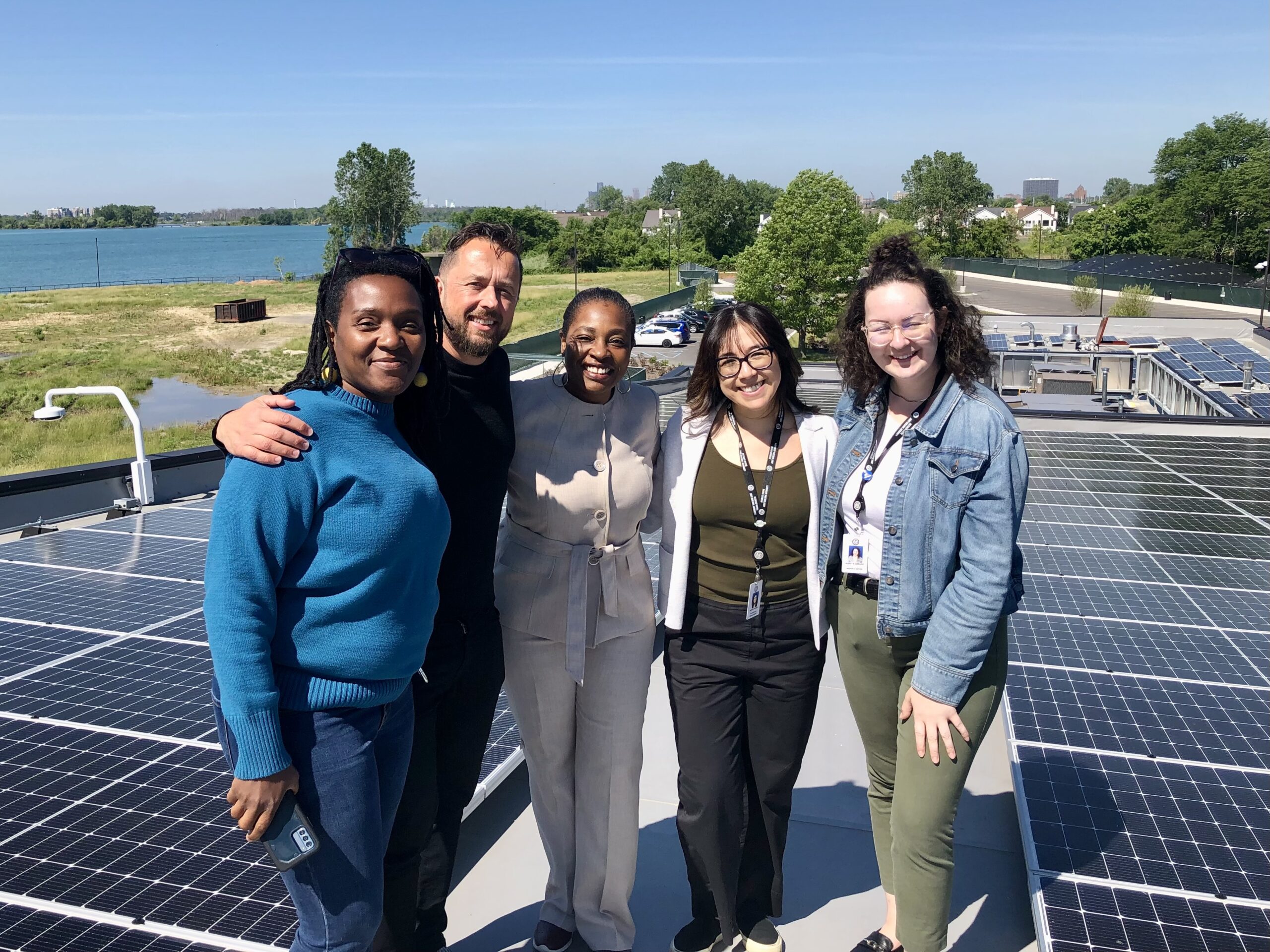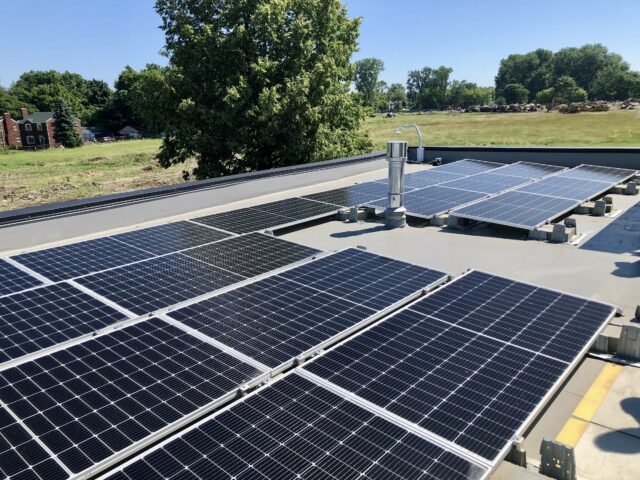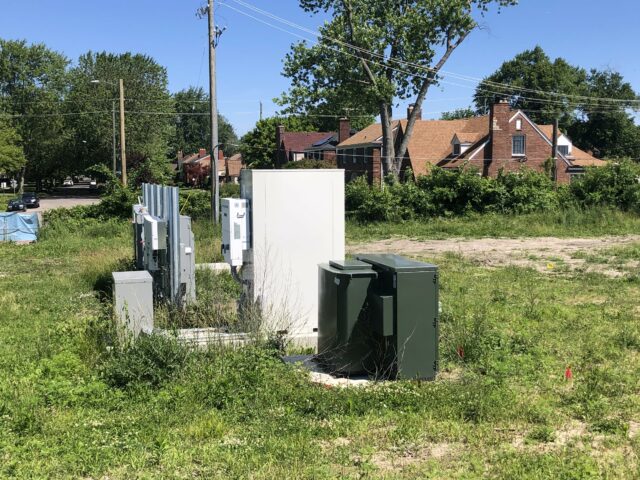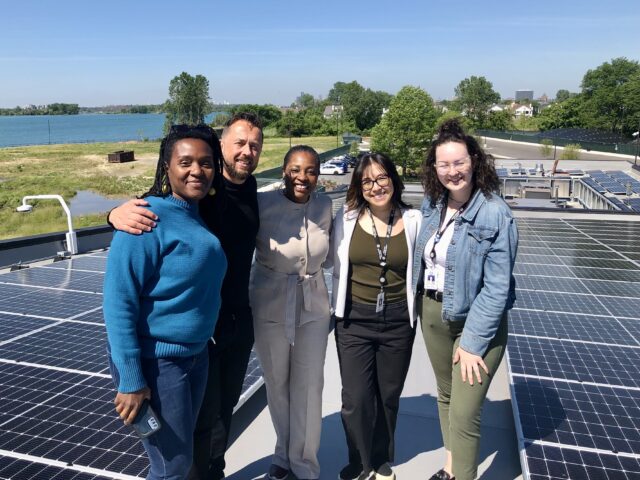A.B. Ford Resilience Hub
Powered by solar+storage, this community center will stay open during a crisis – providing lifesaving access to food and water, heat, or cooling.

Project partners on the roof of the A.B. Ford Community Center. From left to right: Patrice Brown, City of Detroit; Tim Skrotzki, Elevate; Shawna Forbes Henry, Elevate; Maria Galarza, City of Detroit; Rebecca Serrano, Michigan Climate Corp Fellow.
Floods, heat waves, power outages – in recent years, the people of Detroit have seen them all. And, as climate change collides with longstanding inequities and aging infrastructure, many of the City’s neighborhoods are at risk.
Jefferson Chalmers is a case in point. Built on former wetlands in the Detroit River floodplain, the neighborhood endured five damaging floods between 2011 and 2021. So, when the City of Detroit planned a new community center in Jefferson Chalmers, residents embraced the idea of making the center a “resilience hub” where they can safely gather in a disaster.
Opened in October 2023, the 8,600 square foot A.B. Ford Community Center is a hub of activity on an ordinary day. Local kids drop in for help with their homework, while elders take ballroom dancing or play bingo.
Powered by solar panels with a battery backup (solar+storage), the center will stay open during a crisis – providing lifesaving access to food and water, heat, or cooling. In a power outage, residents can come to A.B. Ford to charge their devices, refrigerate their medication, and stay connected. Fortunately, the center has not yet been tested in a disaster, but its solar panels are expected to save the City 15-20% on the facility’s electric bills.
Planning for Resilience
In 2020, Maria Galarza – then a planner at Detroit’s Department of Parks and Recreation – was leading a community engagement process for the A.B. Ford center. At the time, residents were reeling from repeated flooding and a global pandemic. Galarza had read about resilience hubs, and she pitched the idea to residents and her colleagues at the City. “It really resonated,” Galarza says. “People wanted a centralized place where they could get their vaccine or pick up food boxes for neighbors in need.”
Joel Howrani Heeres, then Detroit’s Director of Sustainability, moved the project forward. Howrani Heeres reached out to the Eastside Community Network (ECN), a trusted local organization with deep roots in Jefferson Chalmers and surrounding neighborhoods, and Elevate, a nonprofit that provides clean energy solutions to disadvantaged communities. ECN and Elevate were already working to create a network of resilience hubs at community-serving facilities in Eastside Detroit, and Howrani Heeres suggested they collaborate on a shared vision for hubs throughout the city.
The first step at A.B. Ford was to conduct a feasibility assessment. Through the Clean Energy Group’s Technical Assistance Fund, a third-party engineer conducted a solar+storage assessment, producing a comprehensive report on system sizing, backup power duration, and potential revenue-generating opportunities.
Elevate provided technical assistance -- serving as a fiduciary, providing construction oversight, and soliciting bids for the project. While construction of the community center was funded by the City, the General Motors Climate Equity Fund supported the full cost of the solar+storage system. The GM Fund also underwrote the Detroit Clean Energy Contractor Accelerator program, administered by Elevate, which trained Detroit-based Black-owned companies to install the system. The City is now exploring whether the project qualifies for significant tax credits under the Biden administration’s Inflation Reduction Act.
Lessons Learned
The project has not been without challenges. Planning was tricky, because architects had to design the building before funding was secured for the solar+storage system. But perhaps the biggest hurdle was getting the City’s construction team fully on board. Given Detroit’s limited resources, “There was worry and hesitation,” says Galarza, now deputy director of Detroit’s Office of Sustainability. “People asked, ‘What happens when it breaks? Will we be able to replace parts? What’s the cost going to be?’”
Those worries were assuaged by fostering dialogue between staff, consultants, and construction leads, encouraging all to speak freely about their concerns. Galarza also recommends budgeting for five years of maintenance on a new solar+storage system, so staff can learn the nuts and bolts of system upkeep. And it’s important to “balance the real and the ideal,” Galarza says: “We might want to go all the way and do a full net-zero building, but that has to be balanced against cost and capacity.”
This text was originally written and published by The Kresge Foundation as A.B. Ford Resilience Hub Case Study.
Photos
Click on the photos below to view full size with captions. Additional project photos are available here.
Installation Details
Year Commissioned
2023
Services Provided
Backup power, cost savings
Supported Infrastructure
Community center
Solar
68.9 kW rooftop mounted
Storage
110 kW/220 kWh lithium ion battery
Project Partners
City of Detroit Office of Sustainability, Clean Energy Group, Elevate, Ryter Cooperative Industries, The Kresge Foundation, Eastside Community Network








